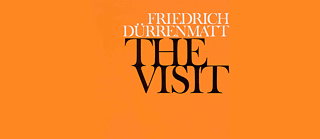Goethe Book Club
Goethe Book Club Goes Digital: The Visit (1956), by Friedrich Dürrenmatt

(EN 1959, 2006) translations by Maurice Valency, Joel Agee
A virtual book club discussion of The Visit / Der Besuch der alten Dame (DE 1956, EN 1959, 2006) by Friedrich Dürrenmatt, translated into English by Maurice Valency in 1959, Joel Agee in 2006
Read and discuss works by contemporary German authors in this series hosted by the Goethe-Institut. All books can be read in recent English translation or in the German original; our discussion will be in English. Led by local German professor Amanda Sheffer (The Catholic University of America), this book club focuses on contemporary fiction and will explore experiences and thoughts about the text.
In cooperation with the Department of Modern Languages and Literatures at the Catholic University of America.
Please Note: In order to participate in the online discussion (carried out over Zoom), registrants must obtain access to the novel on their own. Hard copies of the novel can be ordered through multiple vendors online; the eBook is also available for download to Kindle, iPad, and other digital reading platforms.
The Visit / Der Besuch der alten Dame (DE 1956, EN 1959, 2006) by Friedrich Dürrenmatt, translated into English by Maurice Valency in 1959, Joel Agee in 2006
Güllen's residents boast that Brahms composed a quartet when he visited and Goethe once slept there, but by the time of Freidrich Dürrenmatt’s The Visit, the town has fallen on hard times, its factories shuttered and its residents living on the dole. When prodigal daughter Claire Zachanassian returns, the townspeople hope the millionaires will restore Guellen to its past glory. But the eccentric millionairess, traveling with an entourage that includes husbands (numbers 7, 8 and 9), blind eunuchs, and a black panther, offers them a Faustian bargain and it becomes clear that the town’s financial salvation will come with a high moral price.
Dürrenmatt’s play has the sweep of a Greek tragedy yet is set in a contemporary, dying industrial town; its unemployed serve as a chorus for our age. When the world’s richest woman makes an offer that is hard to refuse, we witness “a community slowly yielding to temptation” and what was at first unthinkable comes to be seen as inevitable.
Source: Grove Atlantic Press
RSVP
Friedrich Dürrenmatt was born in 1921 in the village of Konolfingen, near Berne, Switzerland, and was the son of a Protestant minister. He has long been considered one of the world’s leading German-language playwrights. During World War II he studied philosophy and literature at the Universities of Berne and Zurich. Dürrenmatt, known throughout Europe for some years, was suddenly brought to the attention of American theatergoers in 1958 when The Visit opened on Broadway. So profound an impression did this play make that Dürrenmatt rose to a place alongside Beckett, Ionesco and Anouilh as one of Europe’s foremost dramatic authors.
Each of Dürrenmatt’s plays is imbued with a restless probing of human guilt and justice. Their ethical considerations give them a moral force that sometimes rivals that of Brecht. He wrote prolifically and traveled widely in the 1950s, ’60s, and ’70s, taking particular interest in human rights and the preservation of Israel. He wrote prolifically and traveled widely in the 1950s, ’60s, and ’70s, taking particular interest in human rights and the preservation of Israel. Dürrenmatt died in December 1990.
Source: Grove Atlantic Press
Joel Agee has translated numerous German authors into English, including Heinrich von Kleist, Rainer Maria Rilke, and Elias Canetti. In 2005 he received the Modern Language Association’s Lois Roth Award for his translation of Hans Erich Nossack’s The End: Hamburg 1943.
RSVP
Discussion of Dürrenmatt's work will take place via Zoom on Tuesday, May 11, at 6:30 pm Eastern. Please RSVP via Eventbrite in order to receive discussion prompts and the Zoom invite link. Discussion prompts from moderator Dr. Amanda Sheffer will be emailed to all participants RSVP'd via Eventbrite in advance of the discussion. The Zoom invite and additional directions/tips for accessing the Zoom discussion will be emailed to all participants no less than 48 hours before the discussion begins. The discussion will take place in English.
Details
Online
Language: English
Price: Free Admission
info-washington@goethe.de
Part of series Goethe Book Club 2020-2021